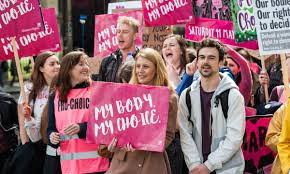A co-executive director of the Positive Women’s Network USA details how the HIV movement finds its way.
By Naina Khanna | POZ via PrideNation
Abortion is no longer a constitutionally protected right in the United States and millions of people have already lost access to abortion.
Many other rights are vulnerable in the aftermath of the fall of Roe v. Wade. It should not need saying at this point that PWN members and leaders will fight to the end to protect same sex marriage, contraceptive access, full rights, dignity and freedom for queer and trans people. Women living with HIV have come through before and we will again. But also, the threat itself of abortion becoming illegal and inaccessible — aka the threat to constitutionally subjugate people who can get pregnant — primarily harming women and trans people of color and those with less access to money and resources, should have already been enough for the HIV community to stand with us and with Black and brown women, trans and nonbinary leaders over decades in the decades-long struggle to protect abortion access and reproductive freedom.
I have not forgotten sitting in federal HIV policy coalition spaces a week after the November 2016 election, as one of a handful of women of color, being told by mostly cis white men that the HIV organizations they lead would flat out refuse to show support for Planned Parenthood for fear of compromising their relationships and funding in state legislatures. The fact that this was even a calculation — and that the calculated result was that the HIV community could possibly win in the long term without protecting reproductive rights — was a stunning display of the deep misogyny, white supremacy, lack of understanding of power, and sexual stigma that continue to plague the HIV response. A similar dynamic was repeated in the same space a couple of years later during the racial justice uprising.
And yes, we remember who said what and also who in the room was silent during these conversations.
Now folks are asking: now what?
PWN will do what we have always done. Ride with us if you want to survive.
Deep work: Political Education, Constituency-led Policy Recs, Leadership Development
Loretta taught us. Monica taught us. Dazon taught us. Marsha taught us. Juanita taught us. Deon taught us. Malika taught us. And so many more.
In the tradition of SisterSong and with inspiration mostly from fierce Black women leaders, PWN has been training HIV advocates and leaders on a reproductive justice framework since shortly after our founding. It’s why we took on HIV decriminalization as a reproductive justice, feminist and racial justice issue over a decade ago, when women living with HIV were by and large pro-criminalization (for a whole set of complicated reasons that can be discussed another time). We regularly conduct political education with and for our own constituency to advance our own analysis and action on racial justice, trans liberation, abolition, reproductive justice. A few examples:
- In 2017, PWN released Bodily Autonomy: A Framework to Guide our Future, developing theoretical links between reproductive freedom, freedom to migrate, sex worker rights, queer and trans liberation, and freedom from state violence, including policing, criminalization and surveillance.
- PWN currently runs a Reproductive Justice for Black Lives ambassadors program in Louisiana and Alabama to build a pipeline of intersectional reproductive justice leaders from the HIV community in states that are decimating sexual health and rights, queer and trans rights.
- PWN consistently produces policy analysis and policy collaterals grounded in reproductive justice principles, including this trans-centered reproductive justice policy agenda
- Through our RISE Gender Justice training program, launched in 2019, we pay, train, and support BIPOC people of trans experience living with HIV to cultivate their expertise as reproductive justice and gender justice trainers and to expand that analysis in the HIV community by delivering trainings and technical assistance – with compensation.
TAKE ACTION: Learn about what reproductive justice means. If you want to become more grounded in a reproductive justice analysis, take our pledge to fight for reproductive freedom. PWN will be hosting a virtual reproductive justice teach-in this summer and we will follow up anyone who pledged to invite you to join us.
Organizing for Repro Freedom: Educating, mobilizing and turning out voters; pushing for policy solutions and leadership on key racial justice and reproductive justice issues.
PWN has been building power and demonstrating the HIV community’s reach at the ballot box. We will never win through legislative or administrative advocacy alone. Achieving justice and liberation for our communities requires a strong, informed, mobilized, and prepared base. We need to be clear about what’s already working to take care of our people that can be replicated or scaled, and we need policymakers who reflect our values, who will engage with us meaningfully, and who will carry our priorities. Part of this means building electoral power which helps produce electoral accountability. PWN has been running integrated voter engagement work since 2018. Here’s a live update from the NYTimes on the state of abortion access across the US for a sense of what is at stake this election cycle. Our work is not done.
In 2020 alone, PWN contacted nearly half a million voters in Colorado, Pennsylvania, and Texas and mobilized low-turnout communities to the polls. During the November 2020 election cycle, we reached 125,000 voters in Harris County, Texas alone. You may recall that during that cycle, Republicans filed a lawsuit to try to discard 127,000 drive through ballots in the same county (they lost). We reached almost as many voters as they desperately tried to disenfranchise. PWN has continued to reach, mobilize and educate voters in the 2021 general elections and now are working on the 2022 primaries and midterms.
2022: Protecting abortion in Colorado:
At the moment, Colorado is literally an abortion oasis surrounded by states (OK, TX, SD, UT) that have decimated abortion access. Colorado abortion providers have seen an influx of folks seeking abortions from surrounding states, leading to increased waiting periods for related services. We expect this need to grow now that Roe has been overturned. Our electoral work in Colorado in 2020 was in large part designed to defeat a statewide ballot initiative, Prop 115, that would have severely restricted abortion access in the state of Colorado. Through phone banking and text messaging, PWN members and allies contacted 157,000 voters about Prop 115 in Colorado. Working in coalition with many other reproductive justice organizations, we helped defeat Prop 115 in Colorado (and btw, also helped pass Prop 118, which expanded non-heterosexist paid family medical leave in the state of Colorado – another reproductive justice victory).
But we didn’t stop there. Over the past 7 years, PWN Colorado has helped draft, amended, stalled, and/or helped to pass multiple pieces of legislation in Colorado, including HIV modernization in 2016. In 2022, among other bills, we activated on the Reproductive Health Equity Act (RHEA) which guarantees the right to abortion access in Colorado. We helped inform the draft language to ensure the final bill was gender-inclusive, so anyone who needs an abortion in Colorado is protected. RHEA passed and was signed by the Governor in April 2022.
At this exact moment, the weekend after after the SCOTUS decision and the weekend before the Colorado primary, PWN Colorado is out knocking doors in Denver conducting what is called “deep canvassing” on abortion access. We are talking to Colorado voters throughout the state about their perspectives on abortion, engaging in reflective listening, sharing stories, having literal deep conversations with those who are willing. We have been having these conversations with voters on the phone and at the doors since May. In the process, we identify and document supporters to follow up with, recruit, and mobilize to vote, to take legislative action, to get in the streets, to organize their own communities.
Why are we doing this?
- Changing hearts and minds.
Abortion, which was once a bipartisan issue, has been intentionally framed by the far right as an ideologically divisive partisan issue – as have trans rights, queer liberation, critical race theory, and more. These divisions are not, and never were, inevitable. This is part of a large cultural project to cement patriarchy and white supremacy. We are at a point in this country where we cannot secure rights and liberation without changing hearts and minds. Deep canvassing is an important strategy that has been shown, for example, to reduce anti-trans bias.
- Building a stronger cross-movement progressive base, community, and movement.
There are a lot of folks disheartened and isolated, feeling the same despair and loss of hope that we are all feeling right now. We are offering them a place to plug in and get active, especially in their neighborhoods and communities. We are also clear that for those who are on the fence – when we build base and community through deep, meaningful and respectful engagement on an issue like abortion, we create a stronger foundation to fight for LGBTQ rights and liberation, for racial equity, for sex worker rights, for HIV resources and policy. We will go back to these Colorado voters to offer them political home, community, further resources and information, and ways to take action – through elections, legislative sessions, and beyond.
- Abortion isn’t safe in Colorado either!
Anti-choice activists are currently collecting signatures to place another abortion ban on the ballot in November. We won’t know until August or September if it has qualified. Abortion bans have been on the Colorado ballot 4 times in the last 12 years. So we could very well be fighting another proposed abortion ban this fall.
We also expect both pro-choice and anti-choice legislation to be introduced in Colorado’s 2023 legislative session. We will be prepared to fight for what we want and will have a base of supporters to mobilize.
The Colorado primary election is this Tuesday June 28th. But we will be throwing down to protect abortion and fight for a broad reproductive justice agenda all summer long and 365 days a year. In addition to Colorado, this year, we’ll also continue organizing deeply in Alabama, Louisiana, Pennsylvania, South Carolina and Texas, with lots of virtual volunteer opportunities to advance a broad, racial, gender, and economic justice-based agenda during a critical election cycle, where so much is at stake. Will you join us? Sign up here.
We are in this for the long game and we are not confused about the connections between attacks on Black, Latinx, Asian and Arab people; repro rights; trans and queer liberation; immigrant rights, safety and dignity; and policing and surveillance of our communities. We are clear that white supremacy and patriarchy will stop at nothing to ensure their own survival.







